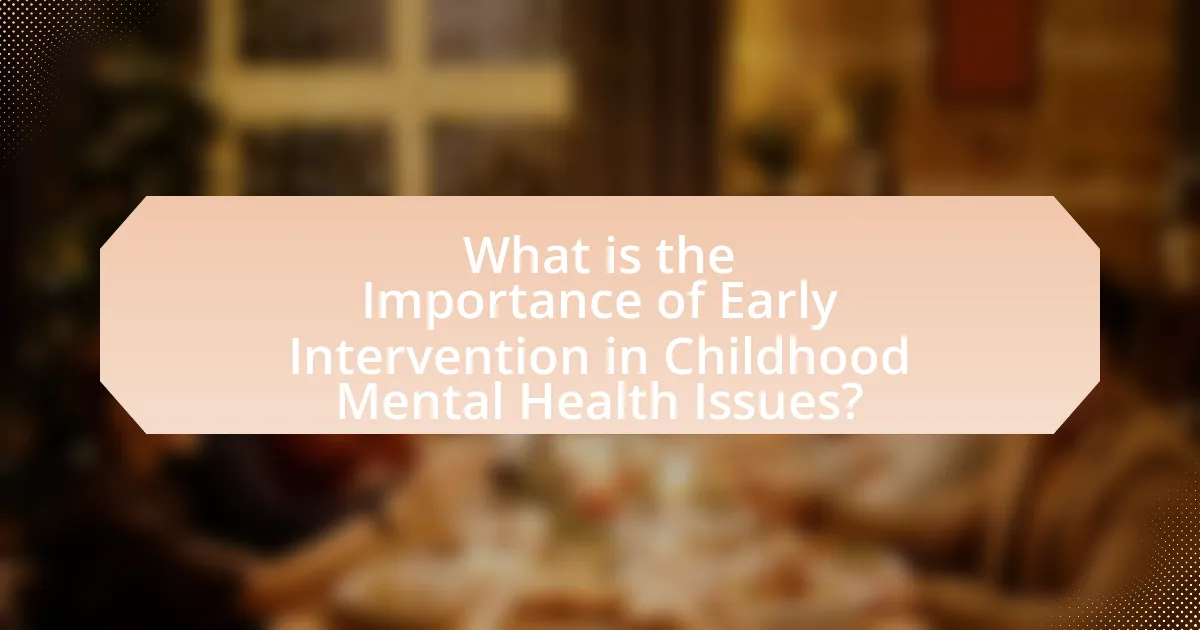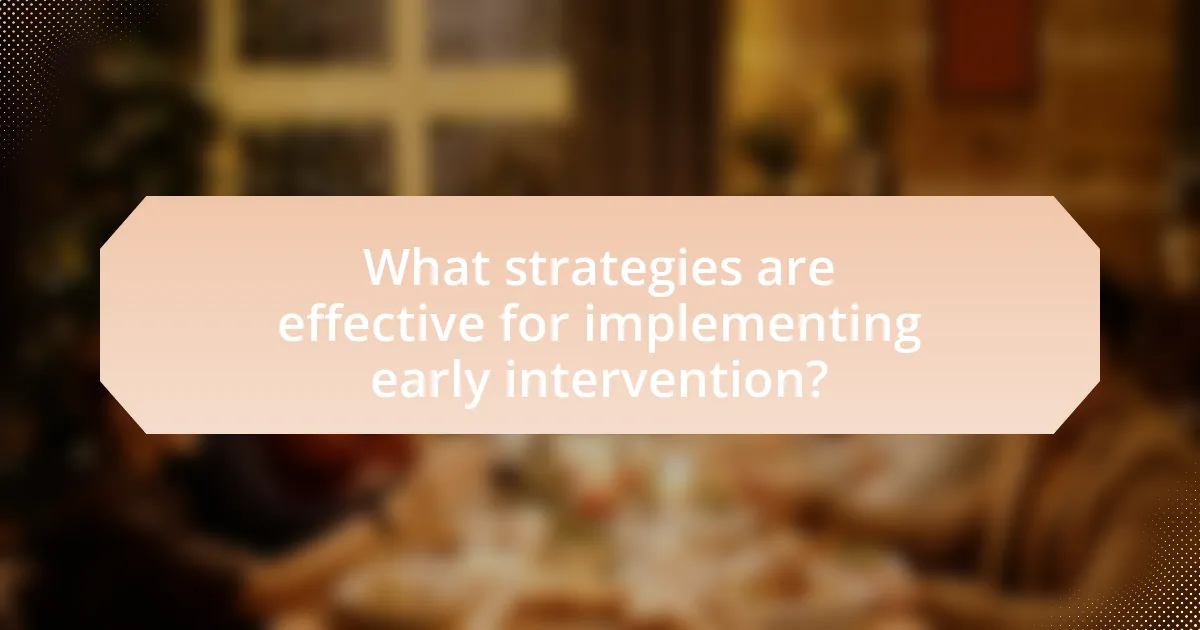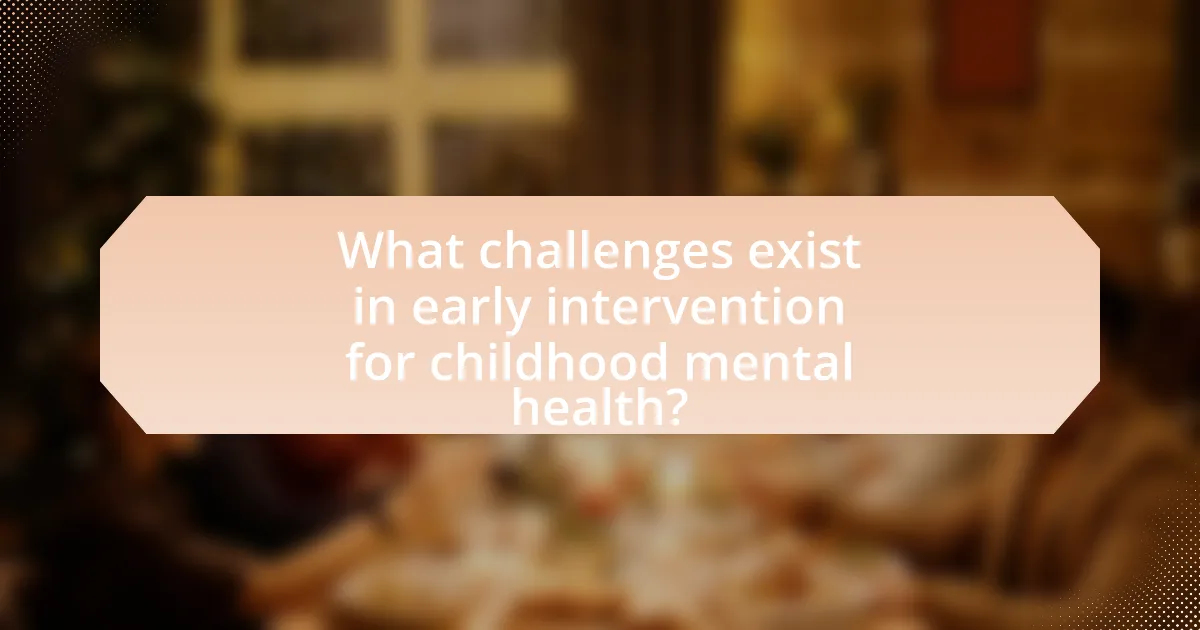Early intervention in childhood mental health issues is essential for improving long-term outcomes for affected children. Research shows that timely identification and treatment can enhance academic performance, social skills, and reduce the risk of severe mental health disorders later in life. Key mental health issues that benefit from early intervention include anxiety disorders, depression, ADHD, and behavioral disorders. The article discusses the importance of recognizing early warning signs, the role of educators and professionals, effective intervention strategies, and the systemic challenges families face in accessing these services. Evidence supporting the effectiveness of early intervention highlights its critical role in fostering healthier developmental trajectories for children.

What is the Importance of Early Intervention in Childhood Mental Health Issues?
Early intervention in childhood mental health issues is crucial because it significantly improves long-term outcomes for affected children. Research indicates that early identification and treatment of mental health conditions can lead to better academic performance, enhanced social skills, and reduced risk of developing more severe mental health disorders later in life. For instance, a study published in the Journal of the American Academy of Child and Adolescent Psychiatry found that children who received early intervention services showed a 50% reduction in behavioral problems compared to those who did not receive such services. This evidence underscores the importance of timely support in fostering healthier developmental trajectories for children facing mental health challenges.
Why is early intervention crucial for childhood mental health?
Early intervention is crucial for childhood mental health because it significantly improves long-term outcomes for children facing mental health challenges. Research indicates that early identification and treatment of mental health issues can lead to better academic performance, improved social skills, and reduced risk of developing more severe mental health disorders later in life. For instance, a study published in the Journal of the American Academy of Child & Adolescent Psychiatry found that early intervention can reduce the prevalence of mental health disorders by up to 50% when addressed before age 5. This evidence underscores the importance of timely support and intervention in fostering healthier developmental trajectories for children.
What are the key mental health issues that can be addressed through early intervention?
Key mental health issues that can be addressed through early intervention include anxiety disorders, depression, attention-deficit/hyperactivity disorder (ADHD), and behavioral disorders. Early intervention can significantly reduce the severity of these conditions, as research indicates that timely support can lead to improved outcomes. For instance, studies show that early treatment of anxiety and depression can decrease the risk of developing more severe mental health issues later in life. Additionally, addressing ADHD early can enhance academic performance and social skills, while interventions for behavioral disorders can prevent future legal and social problems.
How does early intervention impact long-term mental health outcomes?
Early intervention significantly improves long-term mental health outcomes by addressing issues before they escalate. Research indicates that timely support can reduce the severity of mental health disorders, enhance coping skills, and improve overall functioning. For instance, a study published in the Journal of the American Academy of Child & Adolescent Psychiatry found that children receiving early intervention services showed a 50% reduction in the risk of developing severe mental health issues later in life. This evidence underscores the critical role of early intervention in fostering resilience and promoting healthier developmental trajectories.
What are the signs that indicate the need for early intervention?
Signs that indicate the need for early intervention in childhood mental health issues include persistent changes in behavior, such as extreme mood swings, withdrawal from social interactions, and difficulty concentrating. These behaviors can manifest as excessive crying, aggression, or a noticeable decline in academic performance. Research shows that early identification of these signs can lead to more effective treatment outcomes, as children who receive timely support are less likely to develop severe mental health issues later in life. For instance, a study published in the Journal of the American Academy of Child & Adolescent Psychiatry found that early intervention can significantly reduce the risk of developing chronic mental health disorders.
How can parents and caregivers recognize early warning signs?
Parents and caregivers can recognize early warning signs of mental health issues by observing changes in behavior, mood, and social interactions. Specific indicators include persistent sadness, withdrawal from friends and activities, drastic changes in eating or sleeping patterns, and difficulty concentrating. Research indicates that early identification of these signs can lead to timely intervention, which is crucial for effective treatment and support. For instance, a study published in the Journal of the American Academy of Child and Adolescent Psychiatry highlights that early detection can significantly improve outcomes for children facing mental health challenges.
What role do educators play in identifying mental health issues in children?
Educators play a crucial role in identifying mental health issues in children by observing behavioral changes and academic performance. They are often the first adults to notice signs of distress, such as withdrawal, changes in mood, or difficulties in concentration, which can indicate underlying mental health concerns. Research indicates that teachers can recognize these signs early, facilitating timely interventions that can significantly improve outcomes for affected children. For instance, a study published in the Journal of School Psychology found that teachers’ observations are vital in the early detection of anxiety and depression in students, leading to appropriate referrals for mental health support.

What strategies are effective for implementing early intervention?
Effective strategies for implementing early intervention include establishing a multidisciplinary team, utilizing evidence-based practices, and engaging families in the process. A multidisciplinary team, consisting of professionals from various fields such as psychology, education, and healthcare, ensures comprehensive assessment and tailored interventions. Evidence-based practices, such as cognitive-behavioral therapy and parent training programs, have been shown to improve outcomes for children with mental health issues. Engaging families fosters collaboration and support, which is crucial for the success of interventions. Research indicates that early intervention can significantly reduce the severity of mental health issues, with studies showing that timely support leads to better long-term outcomes for children.
How can families access early intervention services?
Families can access early intervention services by contacting their local early intervention program, which is typically managed by state or regional agencies. These programs provide resources and support for children with developmental delays or disabilities, ensuring that families receive the necessary assessments and services. According to the Individuals with Disabilities Education Act (IDEA), families can initiate the process by requesting an evaluation through their state’s early intervention system, which is designed to identify eligible children and provide tailored support.
What types of professionals are involved in early intervention?
Early intervention involves a variety of professionals, including pediatricians, psychologists, speech-language pathologists, occupational therapists, and special education teachers. These professionals collaborate to assess and address developmental delays and mental health issues in children. For instance, pediatricians conduct initial screenings and refer families to specialists, while psychologists provide therapeutic support and assessments. Research indicates that multidisciplinary approaches enhance outcomes for children, as evidenced by studies showing improved developmental trajectories when multiple professionals are involved in early intervention programs.
How can community resources support early intervention efforts?
Community resources can significantly enhance early intervention efforts by providing accessible support services, educational programs, and collaborative networks. These resources, such as local mental health clinics, schools, and community organizations, facilitate early identification of mental health issues in children, enabling timely intervention. For instance, studies show that community-based programs can reduce the onset of mental health disorders by up to 30% when they provide early screening and support services. Additionally, partnerships between schools and mental health professionals can create a comprehensive support system that addresses children’s needs holistically, leading to improved outcomes in mental health and academic performance.
What evidence supports the effectiveness of early intervention?
Early intervention is effective in improving outcomes for children with mental health issues, as evidenced by numerous studies. Research published in the “Journal of the American Academy of Child & Adolescent Psychiatry” indicates that early therapeutic interventions can significantly reduce symptoms of anxiety and depression in children, leading to better academic performance and social functioning. Additionally, a meta-analysis conducted by the National Institute for Health and Care Excellence found that early intervention programs can decrease the likelihood of developing more severe mental health disorders later in life. These findings underscore the critical role of timely support in enhancing long-term mental health outcomes for children.
What research findings highlight the benefits of early intervention?
Research findings indicate that early intervention significantly improves outcomes for children with mental health issues. A study published in the journal “Pediatrics” by McGorry et al. (2018) found that early treatment for conditions such as anxiety and depression can lead to a 50% reduction in symptoms and a 30% increase in overall functioning. Additionally, the “Early Psychosis Prevention and Intervention Centre” reported that early intervention can decrease the duration of untreated psychosis, which is linked to better long-term prognosis. These findings underscore the critical role of timely support in enhancing mental health trajectories for children.
How do different intervention models compare in effectiveness?
Different intervention models vary significantly in effectiveness, with evidence suggesting that comprehensive, multi-faceted approaches yield better outcomes than singular strategies. For instance, a meta-analysis published in the Journal of the American Academy of Child & Adolescent Psychiatry found that integrated interventions, which combine cognitive-behavioral therapy, family involvement, and school-based support, resulted in a 30% greater improvement in mental health symptoms compared to standard therapy alone. This indicates that models addressing multiple aspects of a child’s environment and support systems are more effective in promoting long-term mental health.

What challenges exist in early intervention for childhood mental health?
Early intervention for childhood mental health faces several challenges, including stigma, lack of resources, and insufficient training for professionals. Stigma surrounding mental health issues often prevents families from seeking help, as they may fear judgment or discrimination. Additionally, many communities lack adequate mental health resources, such as accessible services and funding, which limits the availability of timely interventions. Furthermore, professionals working with children may not receive sufficient training in recognizing and addressing mental health issues, leading to missed opportunities for early intervention. These factors collectively hinder effective early intervention efforts, impacting children’s long-term mental health outcomes.
What barriers do families face in seeking early intervention?
Families face several barriers in seeking early intervention for childhood mental health issues, including stigma, lack of awareness, and financial constraints. Stigma surrounding mental health can lead to feelings of shame or fear of judgment, discouraging families from seeking help. Additionally, many families may not be aware of the signs of mental health issues or the benefits of early intervention, which can delay their response. Financial constraints, such as the cost of therapy or lack of insurance coverage, further complicate access to necessary services. According to a study published in the Journal of the American Academy of Child & Adolescent Psychiatry, nearly 50% of families reported financial barriers as a significant obstacle to accessing mental health care for their children.
How can stigma surrounding mental health affect intervention efforts?
Stigma surrounding mental health significantly hinders intervention efforts by discouraging individuals from seeking help and reducing the likelihood of early diagnosis. When children or their caregivers fear judgment or discrimination, they are less likely to access mental health services, which delays necessary interventions. Research indicates that stigma can lead to a 50% reduction in the likelihood of individuals pursuing treatment for mental health issues, as highlighted in a study published in the Journal of Mental Health. This reluctance to engage with mental health resources ultimately exacerbates the severity of conditions and complicates recovery, demonstrating the critical need to address stigma to improve intervention outcomes.
What systemic issues hinder access to early intervention services?
Systemic issues that hinder access to early intervention services include inadequate funding, lack of trained professionals, and insufficient awareness among families and communities. Inadequate funding limits the availability and quality of services, resulting in long wait times and reduced access for children in need. The shortage of trained professionals, such as mental health specialists and early childhood educators, further exacerbates the problem, as there are not enough qualified individuals to provide necessary interventions. Additionally, many families lack awareness of available services and the importance of early intervention, which can lead to delays in seeking help. According to the National Institute of Mental Health, early intervention can significantly improve outcomes for children with mental health issues, highlighting the critical need to address these systemic barriers.
How can we improve early intervention practices?
To improve early intervention practices, we can enhance training for professionals involved in childhood mental health. Research indicates that comprehensive training programs for educators, healthcare providers, and caregivers significantly increase the identification and management of mental health issues in children. For instance, a study published in the Journal of Child Psychology and Psychiatry found that training programs that focus on recognizing early signs of mental health disorders lead to earlier referrals and better outcomes for children. Additionally, implementing standardized screening tools in schools and pediatric settings can facilitate timely interventions, as evidenced by the American Academy of Pediatrics recommending routine mental health screenings during well-child visits. These strategies collectively contribute to more effective early intervention practices.
What role does training for professionals play in enhancing early intervention?
Training for professionals plays a crucial role in enhancing early intervention by equipping them with the necessary skills and knowledge to identify and address childhood mental health issues effectively. Well-trained professionals can recognize early signs of mental health challenges, implement appropriate interventions, and provide support to families, thereby improving outcomes for children. Research indicates that training programs focused on early intervention strategies lead to increased confidence and competence among professionals, which directly correlates with timely and effective support for children in need. For instance, a study published in the Journal of Child Psychology and Psychiatry found that professionals who underwent specialized training in early intervention techniques were significantly more likely to implement evidence-based practices, resulting in better mental health outcomes for children.
How can public awareness campaigns promote early intervention?
Public awareness campaigns can promote early intervention by educating communities about the signs and symptoms of childhood mental health issues, thereby encouraging timely action. These campaigns utilize various media platforms to disseminate information, which increases knowledge and reduces stigma associated with mental health. For instance, studies have shown that campaigns like the National Alliance on Mental Illness’s “In Our Own Voice” have successfully raised awareness, leading to increased referrals for mental health services. By fostering an informed public, these campaigns empower parents and caregivers to seek help sooner, ultimately improving outcomes for children facing mental health challenges.
What practical steps can families take to support early intervention?
Families can support early intervention by actively engaging in their child’s developmental assessments and seeking professional guidance when concerns arise. This includes monitoring developmental milestones, communicating openly with educators and healthcare providers, and participating in relevant workshops or training sessions. Research indicates that early identification and intervention can significantly improve outcomes for children with mental health issues, as highlighted in the study “The Impact of Early Intervention on Child Development” published in the Journal of Child Psychology and Psychiatry. By taking these steps, families can create a supportive environment that fosters timely intervention and enhances their child’s mental health.